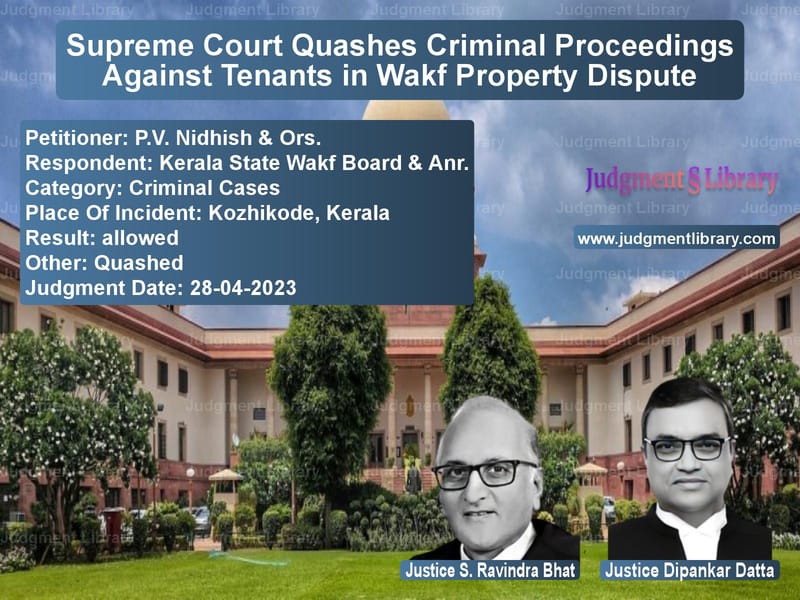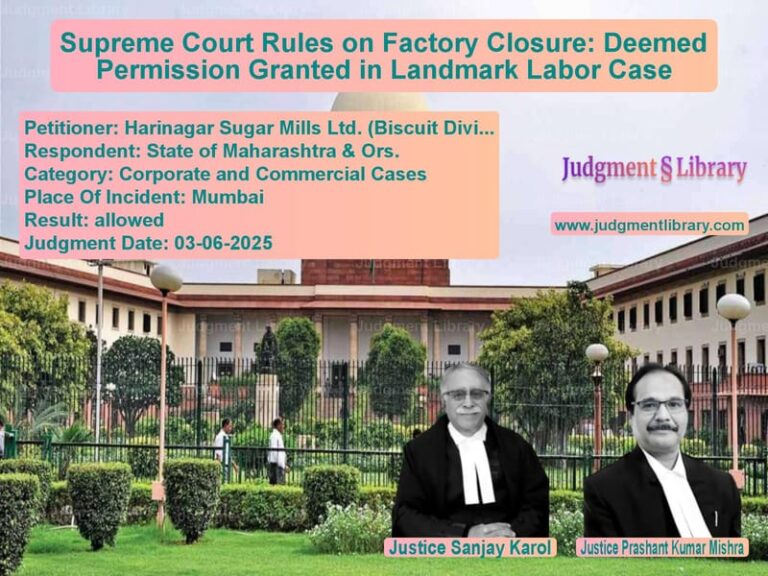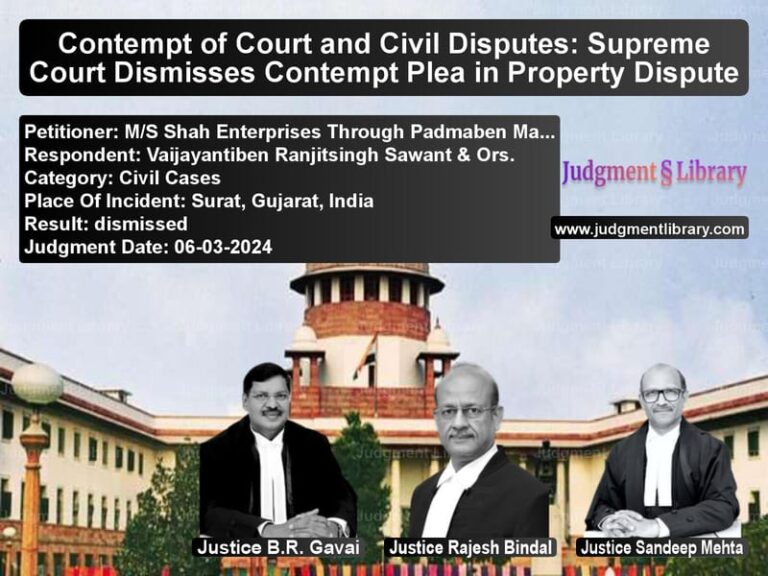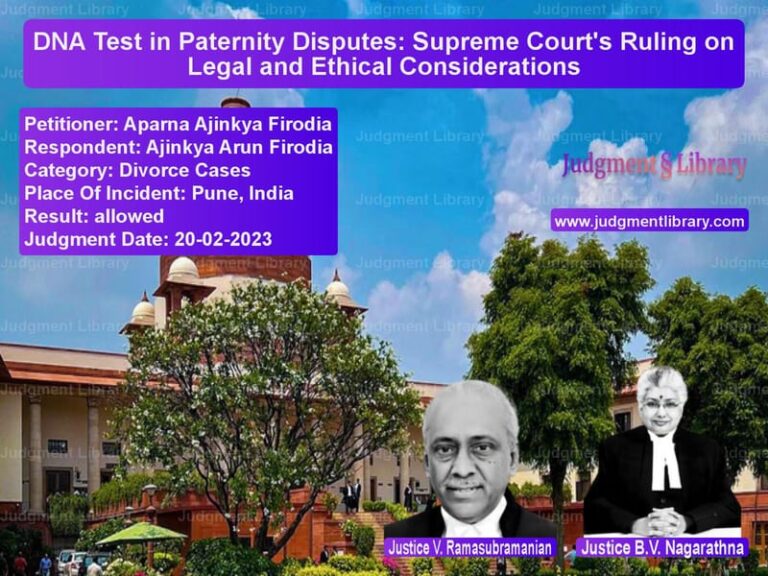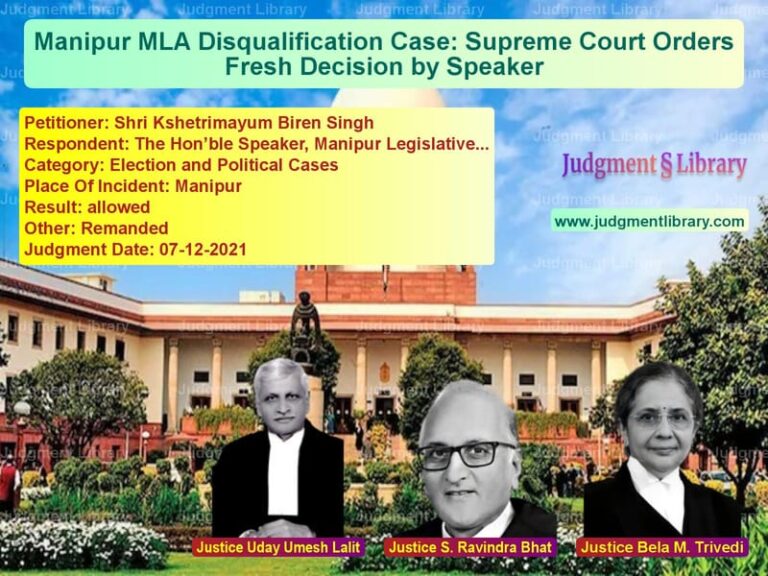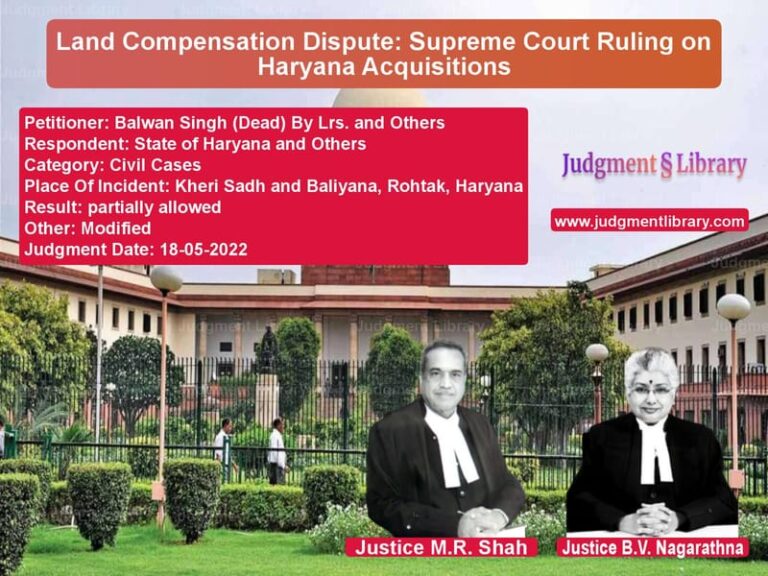Supreme Court Quashes Criminal Proceedings Against Tenants in Wakf Property Dispute
The Supreme Court of India recently delivered a significant judgment in the case of P.V. Nidhish & Ors. v. Kerala State Wakf Board & Anr., where it quashed the criminal proceedings initiated against tenants occupying a Wakf property. The dispute revolved around whether tenants who had occupied the premises for several decades could be classified as ‘encroachers’ under the amended Wakf Act, 1995. The Court ruled that the retrospective application of Section 52A, which criminalizes unauthorized occupation of Wakf properties, would violate Article 20(1) of the Constitution.
Background of the Case
The case dates back to 1916 when the disputed property was leased to Norman Printing Bureau, a publishing firm. The legal status of the property was uncertain due to competing claims between the heirs of the original owner, P.M. Mammu Haji. In 1951, a Wakf was allegedly created, leading to a series of legal battles over the ownership of the property.
Despite multiple litigations, including an interpleader suit filed by the tenants in 1998, the legal status of the property remained unresolved. The Wakf Board initiated eviction proceedings, which were dismissed by the Kerala High Court, stating that eviction could only be pursued through civil proceedings.
In 2013, the Wakf Act was amended, introducing Section 52A, which criminalized unauthorized occupation of Wakf properties. Following this amendment, the Kerala State Wakf Board initiated criminal proceedings against the tenants under Section 52A, alleging that they were ‘encroachers.’ The tenants challenged the proceedings before the Kerala High Court, which rejected their plea, prompting them to approach the Supreme Court.
Petitioner’s Arguments (P.V. Nidhish & Ors.)
- The tenants had lawfully occupied the property for over a century and had been paying rent as directed by a district court decree.
- Section 52A was introduced in 2013, while the tenants had taken possession long before. Applying it retrospectively would violate Article 20(1) of the Constitution, which prohibits ex post facto criminal laws.
- The dispute over the property’s ownership was still pending before the Wakf Tribunal and could not be decided through criminal proceedings.
- The Wakf Board had previously attempted eviction through civil suits, which had not resulted in their removal.
- The tenants had never been declared encroachers through any judicial or administrative process before the amendment.
Respondent’s Arguments (Kerala State Wakf Board)
- The property was part of a registered Wakf, and the tenants had no legal right to continue occupying it.
- Under the amended Wakf Act, anyone occupying Wakf property without proper authorization was an ‘encroacher’ and liable for prosecution.
- Section 52A was intended to curb illegal occupation of Wakf properties, and its application to existing occupants was justified under the principle of a ‘continuing offence.’
- The tenants had been asked to vacate multiple times but had refused, justifying the initiation of criminal proceedings.
Supreme Court’s Observations
- The Court emphasized that Article 20(1) of the Constitution prohibits the retrospective application of penal laws. Since the tenants had occupied the property long before the enactment of Section 52A, they could not be prosecuted under the new law.
- The Court noted that the mere expiration of a lease does not automatically render a tenant an ‘encroacher’. The eviction of tenants must be pursued through proper civil proceedings rather than criminal prosecution.
- The judgment observed that no court had declared the tenants as encroachers before the criminal proceedings were initiated. Without such a declaration, invoking Section 52A was premature and unjust.
- The Court rejected the Wakf Board’s argument that the tenants’ continued possession constituted a ‘continuing offence’ under Section 472 of the CrPC.
- It highlighted that the legislative intent of the 2013 amendment was to prevent fresh encroachments, not to criminalize long-standing tenants.
Key Judicial Findings
- Retrospective Application of Penal Laws: The Court reaffirmed that criminal liability cannot be imposed retrospectively unless expressly stated in the legislation.
- Eviction Must Be Pursued Through Civil Remedies: The judgment emphasized that disputes over possession must be resolved through civil courts or Wakf Tribunals.
- Presumption of Innocence: The tenants could not be treated as criminals merely because of a legal dispute over ownership.
- Distinction Between Tenants and Encroachers: The Court clarified that tenants whose lease had expired could not be automatically treated as encroachers without a proper legal determination.
Final Judgment
The Supreme Court ruled in favor of the tenants:
- The criminal proceedings initiated against them under Section 52A of the Wakf Act were quashed.
- The eviction proceedings must be pursued through civil litigation rather than criminal prosecution.
- The ruling does not affect the ongoing civil disputes regarding the property.
Implications of the Judgment
The ruling has significant implications for similar disputes involving Wakf properties:
- Protection Against Arbitrary Prosecution: The judgment protects long-standing tenants from being arbitrarily criminalized under new laws.
- Clarity on ‘Encroachment’ Definition: The ruling distinguishes between lawful tenants and unauthorized encroachers, ensuring fair treatment.
- Reaffirmation of Constitutional Protections: The decision upholds Article 20(1) and prevents retrospective criminalization of past actions.
- Guidance for Wakf Authorities: The ruling directs Wakf Boards to follow civil litigation procedures instead of criminalizing possession disputes.
Conclusion
The Supreme Court’s decision in P.V. Nidhish & Ors. v. Kerala State Wakf Board & Anr. underscores the fundamental principle that criminal laws cannot be applied retrospectively. By quashing the criminal proceedings, the Court reinforced the rule of law and ensured that long-standing tenants are not arbitrarily prosecuted. The judgment provides crucial clarity on the legal framework governing Wakf property disputes and sets a precedent for future cases.
Petitioner Name: P.V. Nidhish & Ors..Respondent Name: Kerala State Wakf Board & Anr..Judgment By: Justice S. Ravindra Bhat, Justice Dipankar Datta.Place Of Incident: Kozhikode, Kerala.Judgment Date: 28-04-2023.
Don’t miss out on the full details! Download the complete judgment in PDF format below and gain valuable insights instantly!
Download Judgment: p.v.-nidhish-&-ors.-vs-kerala-state-wakf-bo-supreme-court-of-india-judgment-dated-28-04-2023.pdf
Directly Download Judgment: Directly download this Judgment
See all petitions in Bail and Anticipatory Bail
See all petitions in Property Disputes
See all petitions in Legal Malpractice
See all petitions in Judgment by S Ravindra Bhat
See all petitions in Judgment by Dipankar Datta
See all petitions in allowed
See all petitions in Quashed
See all petitions in supreme court of India judgments April 2023
See all petitions in 2023 judgments
See all posts in Criminal Cases Category
See all allowed petitions in Criminal Cases Category
See all Dismissed petitions in Criminal Cases Category
See all partially allowed petitions in Criminal Cases Category

